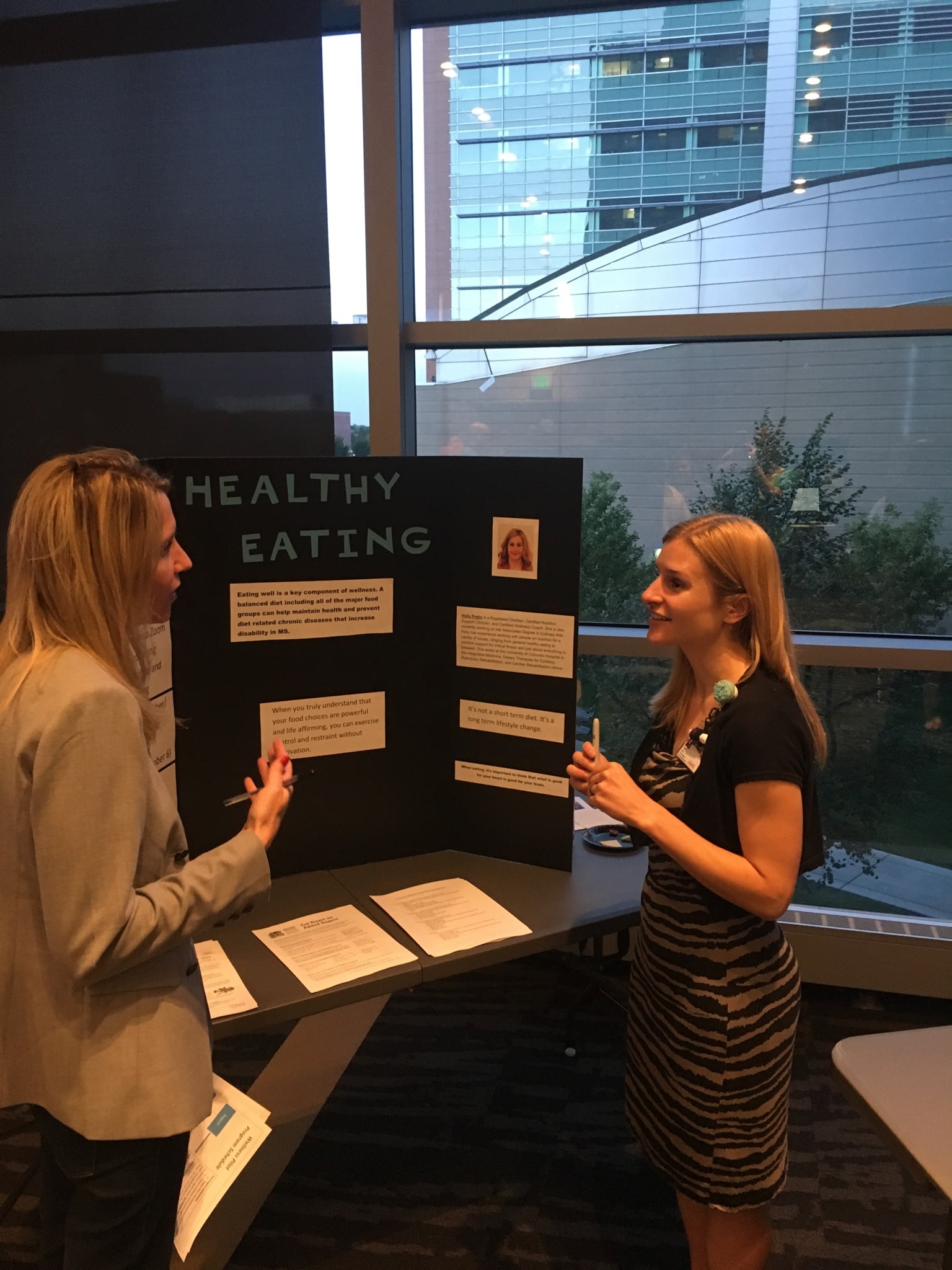Some of the questions that we hear frequently from people living with MS are around the topics of diet and nutrition. “What foods should I avoid?” “Is there an MS diet?” Indeed, a healthy and nutritious diet along with an active lifestyle is a key part of maximizing your lifelong brain health.
But with information coming at all of us faster and in higher volumes than ever, it’s sometimes hard to know what’s fact and what’s fiction when it comes to a healthy diet. With so much out there, what’s the best way to think about how to approach our nutrition to promote our health, especially while living with MS?
We recently spoke with Holly Prehn, registered dietician at the Center for Integrative Medicine at University of Colorado Hospital to learn more about healthy nutrition, the role of diet in MS, and practical tips for making changes in your nutritional habits.

Holly Prehn (right) speaks on the Anschutz Medical Campus.
InforMS: As a registered dietician, could you please tell us about your role?
Holly Prehn: Registered dieticians provide services for clients in hospitals, long-term care facilities, clinics, private practice, and other facilities. We create nutritional programs based on the health needs of patients or residents and counsel patients on how to lead a healthier lifestyle. We work on an in-patient capacity for people who are dealing with illness, we work with athletes and people in every disease state, including kidney disease, MS, cardiac and pulmonary disease, and diabetes.
InforMS: How do you think about nutrition and MS?
Holly Prehn: I think about how your diet can impact everything else that’s going on with your body, your MS, and how you are feeling. For example, if you’re having significant MS fatigue issues and then on top of that you have an unhealthy diet, your fatigue is very likely to worsen. That’s why it’s important to see food as fuel – choosing the food that’s going to fuel your body and avoiding food that doesn’t feed your system in a healthy way.
InforMS: Is there a particular diet you recommend for people living with MS?
Holly Prehn: There’s not a specific diet that controls MS. However, there are a number that have been promoted for MS. A systematic review among dietary interventions in MS failed to confirm the benefits of the Swank and other alternative diets.
The Swank diet is a very stringent low fat diet. It avoids dairy, gluten, legumes, and virtually all saturated fats. Good results in Swank’s research study were reported, however the study was limited by various issues (absence of blindness, no control, and no randomization).
Other researchers haven’t duplicated the results and there’s no generally accepted proof that the Swank diet really controls MS.
The Paleo diet is promoted by Dr. Terry Wahls. It recommends consuming non-domesticated, lean meats, and plant-based foods except fruits, nuts, roots and legumes, or gluten-containing grains. This diet also avoids eggs and dairy. Limitations of this diet include risk for nutritional deficiencies including folic acid, vitamin B1, vitamin B6, calcium, and vitamin D.
The McDougall diet is a very low-fat, plant-based, high-carbohydrate diet. One study found this diet reduced fatigue but did not show an effect on MS disease activity.
The bottom line at this point is that different diets have been suggested for MS, but none has been shown to be superior to others, and there’s no concrete evidence that a specific diet controls MS.
InforMS: So, what DO we know about good nutrition and MS?
Holly Prehn: Good nutrition is important for people with MS because it can have a positive impact on some MS symptoms and also lowers the risk of disease and other disorders. What we know is that what’s good for your heart is good for your brain, and so until there’s solid evidence showing a specific diet is better for MS, following a healthy diet pattern such as the Mediterranean Diet, the US 2015 Dietary Guidelines, or the DASH (or dietary approaches to stop hypertension) diet is a reasonable option.
InforMS: What are the benefits of the Mediterranean diet?
Holly Prehn: The Mediterranean diet hasn’t been studied in MS, but it has been shown to reduce in ammatory markers in other autoimmune diseases. The Mediterranean diet has anti-inflammatory effects and reduces vascular disease, making it possibly beneficial in MS.
The Mediterranean diet has consistently been demonstrated to provide a degree of protection against major chronic degenerative disease. It’s associated with reductions in overall mortality, cardiovascular mortality, cancer incidence and mortality, and incidence of Parkinson’s Disease and Alzheimer’s Disease. The Mediterranean Diet is also associated with improved longevity. And it has been shown to be effective against depression and cognitive decline.
InforMS: What are some common themes and challenges that you see people facing when it comes to healthy eating?
Holly Prehn: One of the biggest things that people are up against is time. Our lives are so busy – work, family, and all of the stresses of our day-to-day. And all of that stress is compounded when you are living with MS. The reality is that to eat healthier, it’s either going to take more money or more time in terms of planning and prepping. And for most of us – it’s going to be time.
People who are successfully incorporating healthy eating into their lives are doing the behind the scenes work to set themselves up for success. They’re planning healthy meals, grocery shopping, chopping and preparing things ahead of time when they can. Without that planning, it’s so easy to fall into a pattern of going to the drive-thru restaurant at the end of a long day.
InforMS: If someone changes their diet, how long does it take to see results?
Holly Prehn: A lot of times, people who are trying to lose weight want to see the pounds shed more quickly. That’s generally going to be a longer term process. However, things like improved energy levels can really start to happen in a matter of weeks.
One thing that I recommend is that someone implements diet changes for two weeks and then shift back to your prior diet. You might not even realize some of the more subtle impacts that an improved diet has had until you go back to how you had been feeling when you were eating less than optimally.
InforMS: What kind of dietary changes can make an impact?
Holly Prehn: Increasing your fruits and vegetables and decreasing your intake of sugars and refined carbohydrates can make a real difference in your energy levels. One simple tip for making fruits and veggies easier to eat: Look for pre-packaged fruits and vegetables.
Grocery stores have started carrying lots of pre-sliced vegetables and fruit such as apples – those are helpful because they eliminate the prep work and chopping that can be a deterrent when someone is battling fatigue or pressed for time.
It’s also key to decrease the amount of sugar you are consuming. Not drinking soda can make a real difference for your overall nutritional health and energy levels. If you need caffeine, I recommend having an iced tea with lemon.
InforMS: Why is sugar so bad?
Holly Prehn: In a nutshell, sugar increases inflammation levels in the body. So, when you’re dealing with chronic conditions that increase inflammation levels, sugar can layer on to that problem. And the fact is that we’re all eating way too much sugar. Women should be eating less than 6 teaspoons of sugar per day and for men that amount is less than 9 teaspoons per day. Alarmingly, our average daily consumption is a whopping 22 teaspoons a day, and that is doing us some harm.
The tough part is that sugar is hiding in a lot of processed food that you wouldn’t necessarily expect. Let’s look at yogurt. In some popular flavored yogurts, there is almost 2 tablespoons of sugar in a single serving! If you chose plain yogurt and add some fruit, you can still get the same overall taste but in a much healthier way.
InforMS: What about sugar in fruit?
Holly Prehn: When you are eating fruit or even milk, your body processes it differently than when it’s refined, added sugar. Fruit and milk have nutrients – there are vitamins in fruit and protein in milk. And your body responds to that kind of sugar differently.
InforMS: Sugar is a pretty new villain on the diet front. For a while it was eggs. A lot of foods have assumed the role of villain, only to have thinking on that change down the road. Do you think that will that happen with sugar?
Holly Prehn: No, I don’t. Eggs are a naturally occurring, whole food. If you are eating eggs, you’re getting some benefits since they contain helpful proteins. But sugar is a refined food and it doesn’t have any benefits; the quantities we’re consuming it in are very dangerous.
InforMS: What can someone do to start reducing the amount of sugar they’re eating?
Holly Prehn: Reading labels on any sort of processed food is key. Added and natural sugar are different. The great thing about eating fruits and vegetables and other whole foods is that you don’t have to read a food label if you’re picking up an apple or carrots. Dairy products are diffcult, like the yogurt mentioned earlier. Look for naturally sweet foods, and try cutting out desserts and having a piece of fruit instead. Honey is still an added sugar, as are things like maple syrup and agave.
InforMS: How should someone think about practical ways to eat more healthily?
Holly Prehn: I teach the plate method. If you imagine a nine-inch dinner plate, here’s the breakdown:
• Half of your plate should be comprised of non-starchy vegetables such as salad, bell peppers, onions, cucumbers, asparagus, spinach, cabbage, carrots. With those veggies, you’re getting beneficial fiber, vitamins, and minerals. And by covering half of your plate with the veggies, you’re edging out the portion size of your higher calorie foods.
• One-quarter of your plate should be whole grains or starchy veggies. Think potatoes, corn, peas, brown or wild rice or whole grain bread.
• And finally, one-quarter of your plate should be protein – fish, beans, lean meats such as chicken, and, once in a while, red meat.
• For dessert, choose fruit instead of a high-calorie, sugary desert and try to use herbs and spices to season your food instead of piling on excess salt.
And it’s important to be conscious of portion sizes. I recommend that your portion of starchy foods be about the size of your fist. Your protein should be about the size of the palm of your hand.
InforMS: What about dairy products?
Holly Prehn: There are different recommendations around this subject. The USDA recommends three servings of dairy per day. And with the Mediterannean Diet, it’s a recommended one serving of dairy per day. Because milk and other dairy products include calcium and Vitamin D, this is an important subject to consult with your doctor on since their recommendation may be based on your current bone health and Vitamin D levels.
InforMS: How should someone living with MS think about these recommendations and the current research?
Holly Prehn: I think it’s important to emphasize that we are still working on further research around this topic. However, the Mediterranean Diet study was huge and had clean data so it’s the best data that we have to date and underlines the importance of eating foods that are actual foods found in nature versus processed foods with added sugar, fats, and carbohydrates.
InforMS: What about other diets that people hear about all of the time such as the Wahl’s protocol or the Paleo diet?
Holly Prehn: The Wahl’s protocol is a good approach. However, it’s important to view any dietary method from a practical perspective. If you are currently eating lots of vegetables, the Wahl’s protocol might be a reasonable and achievable next step for you. But if you aren’t eating any vegetables right now, it’s probably not going to work for you.
With the Paleo diet, I see people implementing healthy Paleo approaches and terrible Paleo approaches. If you’re eating a good balance of meat and veggies, that’s one thing. But if you are skipping the veggies and just eating a giant steak with bacon, that is not going to be a healthy course of action.
InforMS: What is your advice for someone who wants to start improving their nutrition?
Holly Prehn: It’s helpful to start with a realistic and achievable goal. Maybe it’s starting with the Mediterranean Diet. Or maybe it’s starting with increasing the amount of vegetables you’re eating.
Be realistic about what you can commit to doing and think carefully about the question: What can I sustain? Successful clients o en start with one thing at a time. For example, if you are eating McDonald’s for every meal, just start with not eating there for breakfast.
I think that it’s also very important to think about the question: What are the benefits to you? We tend to focus on the near term. Maybe right now, I want that donut. But in five years, I want to run a 5K. Start thinking, “That’s my goal, and here’s how I’m going to achieve it.”
I work with a lot of folks who have had heart attacks. They’ve had a real scare and they know what they do with their diet is going to make a real difference. It takes a while to see those changes, but over the course of five, 10, 20 years it’s going to make a diference.
MS patients should really think about diet and nutrition in that same way. It’s tough to see an immediate impact of diet in MS, but over time it can help with symptom management and also prevent other health conditions like diabetes and heart disease. Your nutritional health is preventing those conditions which would make your MS worse.
{loadmodule mod_custom,Social Sharing Bar}







